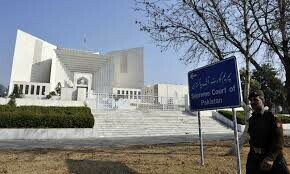LAHORE, Feb 1: Standing in the beautiful gardens of the State Guest House, Sardar Amrinder Singh, the chief minister of the Indian Punjab, was not ruffled to be compressed by the local press. He smiled amiably at everyone and showed no signs of fatigue. It had been a particularly hectic Sunday morning for the chief minister, who had travelled to Nankana Sahib, the birth place of Baba Guru Nanak, then gone to pay homage at the shrine of Hazrat Mian Mir, a saint revered equally by many religious denominations, addressed a joint press conference with his Pakistani counterpart before heading to another reception.
His amusement at being presented with a silver-grey horse by Chief Minister Pervaiz Elahi was all too evident at the way Mr Singh was running his hand over the horse's face. The thanks were profuse as were the warm words exchanged with the journalists and Mr Elahi's entourage gathered around to make a simple gesture turn into a flashing media event.
Considering the time restriction, getting a one-on-one interview seemed next to impossible. In the middle of the junket, Mr Singh turned to his public relations secretary Damanbir Jaspal and said a few minutes could be squeezed in for a brief interview. "We can sit somewhere for a few minutes after all this is over," said Mr Singh. After 'all that was over', the chief minister of East Punjab was rushed back into the press conference room for an exclusive interview with Dawn.
Wearing a white kurta-pyjama and a black sweater, which he laughingly said was made in India, he talked about his three-day visit to the city which holds emotional significance for him.
"My father studied at the Aitchison College here and mother went to the Queen Mary School," he said. "The two Punjabs have a lot in common. I think they can play a major role in affecting a change at the national level. The feeling to improve relations between India and Pakistan is widespread. I have noticed that people on both the sides want the resolution of issues. Hopefully, my visit is a part of that long process which the leaders of our two countries have initiated."
On Jan 30, Mr Singh became the first chief minister of East Punjab to cross into the Pakistani Punjab. He had come at the invitation of Mr Elahi to take part in the World Punjabi Conference.
"The two Punjabs share a common culture and hope the thawing of relations is permanent." As the grandson of Maharaja Bhupinder Singh and son of Lt-Gen Maharaja Yadavinder Singh, a grand commander of the Indian empire and the last hereditary ruler of the erstwhile Indian princely state of Patiala, Amrinder Singh takes his aristocratic lineage with modesty. "My father captained the Indian cricket team in 1935-36 and my grandfather brought the Olympic movement to India in 1922."
Others were not so generous to acknowledge his humility. His appointment as the president of the Punjab Pradesh Congress Committee (I), in July 1988, was likened by a few in India to the continuation of dynastic political stronghold on the lines of Sheikhs of Kashmir and Sanjay and Rajeev Gandhi of Allahabad. But a privileged birth could not have taken him where he stands today.
In August 1985, Mr Singh joined the Shiromani Akali Dal and the following month was elected to the Punjab Legislative Assembly. By way of showing strong resentment to the entry of paramilitary forces and police in the Darbar Sahib in 1984, he resigned from the membership of the parliament and from the Congress (I). It indicated his disapproval of the Indira Gandhi government and, at the same time, underlined his Sikh identity.
And yet, Mr Singh denied the existence of the Khalistan movement at the joint press conference with Mr Elahi. "Khalistan? What is Khalistan? I don't know of any such movement," snapped the East Punjab chief minister at a journalist.
He was re-elected president of the Punjab Pradesh Congress Committee (I) in November, 2000, and at the age of 60 was sworn in as the chief minister of the Punjab on Feb 28, 2002.
If his regal background gave him access to the all-powerful world of politics, his political training assisted him to keep the delicate balance between his Sikh identity and Indian nationalism. He joined the Indian Military Academy, Dehradun, in January 1963 and served in field area on the Indo-Tibetan border for two years. He resigned from the Indian army in 1966.
Part of his political training also meant avoiding irritable questions on outstanding Indo-Pakistan disputes. Evading questions effortlessly, he tailored his answers to make them less innocuous.
Talking about the secular nature of India was one way of avoiding flashpoints and commenting on the role of promoting the Punjabi language was another. "I'm not a patron of the language but, over there in our Punjab, it is the main medium of instruction. I think cultural growth and prosperity are not possible without the promotion of languages. As the world grows technologically, languages naturally take the backseat. It becomes all the more necessary for us to preserve and encourage the growth of the Punjabi language." - Shehar Bano Khan















































Dear visitor, the comments section is undergoing an overhaul and will return soon.